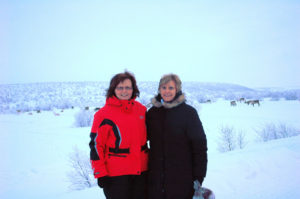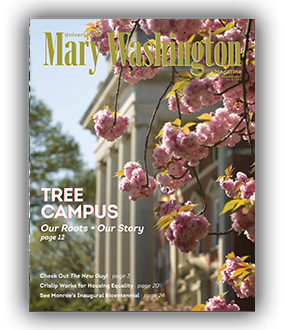
Nancy Maynard, right, on Norway’s tundra with colleague Inger Marie Gaup Eira, a professor at Sami University College.
By Edie Gross
Nancy Maynard’s career path has taken her from the tropical ecosystem of Everglades National Park to the snowy reindeer migration pastures of Norway’s tundra, all in an effort to study the impact of development and climate change on the world around us.
But her scientific journey around the globe started at Mary Washington, where the Maine native studied biology and chemistry before graduating in 1963.
“For a New England Yankee, it was a Southern experience,” she recalled of her time in Fredericksburg. “It was a wonderful environment: fantastic teachers, and the students were really well-rounded and interested in what they were studying.”
Maynard ’63 continued her studies at the University of Miami, earning a master’s degree in zoology and later, a doctorate in marine biology. Maynard and her roommate at UM’s Rosenstiel School of Marine & Atmospheric Science (RSMAS) were among the first women to go to sea on research missions on the institute’s oceanographic research vessels.
“I thought that was a great adventure,” said Maynard, who has always loved the outdoors. “In the process, I found my career in environmental research.”
Maynard’s experience has been vast and varied. She’s studied everything from microscopic algae to the impact of global climate change on public health. In 2012, after more than 20 years at NASA – where she remains a scientist emerita – Maynard returned to the University of Miami as a visiting scientist at the Cooperative Institute for Marine and Atmospheric Studies, a research institute at RSMAS.
Early in her career, Maynard traveled to Bermuda and Alaska to study the impact of oil spills and residual tar on coastal environments. She took a midcareer fellowship at the White House Office of Science and Technical Policy during the Reagan administration, returning six years later to work on Earth sciences and climate change for President George H.W. Bush’s science adviser.
Before and after her final White House post, Maynard worked at NASA, using information gleaned from satellite imagery to measure the impact of climate change on the global environment – and upon the humans and animals that depend on those environments. There, Maynard mentored students from tribal colleges and universities, creating internships on reservations that brought NASA instruction to Native Americans in their own communities. For that, she received the 2008 Robert H. Goddard Award for Exceptional Achievement in Mentoring.
She also enlisted the help of reindeer herders from the U.S., Norway, and Russia to help evaluate climate change in Arctic regions.
“Indigenous people who are reindeer herders have been managing – under the most harsh conditions on the planet – large herds of reindeer for generations. They live and die by whether or not they get it right. . . . Their decisions are critical to the health of the herds, and they have invaluable traditional knowledge about weather, temperatures, and types of snow,” said Maynard, who accompanied Norwegian Sami herders on part of their spring migration in April 2011.
Most recently, she has been studying the impact of global warming on the world’s polar regions, as a lead author on a chapter on the topic for the Intergovernmental Panel on Climate Change’s 2014 report. Simultaneously, she worked as a lead author for a chapter on the impact of climate change on Native American populations for the 2014 U.S. National Climate Assessment.
Polar regions are the geographical canaries in the coal mine – they experience the impacts of climate change faster, providing a signal of what’s coming for the rest of the planet, Maynard said. Earth’s health needs to be a priority for all, and not just for scientists, she said.
“It’s the planet we live on!” she added.
